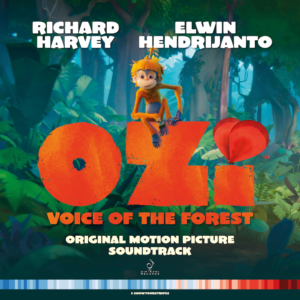Richard Harvey and Elwin Hendrijanto Discuss Scoring ‘Ozi: Voice of the Forest’

Following the release of the GCIFilm animated feature film ‘Ozi: Voice of the Forest’, we spoke with composers Richard Harvey and Elwin Hendrijanto about writing the original score.
The film follows Ozi, a young orangutan who saves her home from deforestation. How did the film’s message resonate with you both?
Richard: Elwin and I feel incredibly strongly about deforestation, loss of habitat and climate change. It was a hat that we both wore throughout, we wanted to be complicit in the messaging of the film, I don’t think I’ve ever been involved in a more organic score.
Elwin: As an Indonesian, I have a deep dream of preserving our beautiful forests, mountains, and seas forever. My vision extends beyond our country to include the natural wonders of the entire world. This commitment is driven not only by a desire to protect these treasures for future generations but also by a profound love for nature itself.
How was the collaboration with the film’s director Tim Harper, and did you face any challenges throughout the scoring process?
Richard: Tim Harper’s a dream director to work with – he’s intuitive musically and knows when to let the composers of the leash and when to bring them to heal (a little!) his direction draws the audience in rather than come “at them” which means that the music could do the same, we could light a candle rather than turning on a floodlight!
Elwin: We can feel his love for the story and characters, and that inspires us. Very clear direction, yet also very trusting and giving us space to explore, experiment, and express emotion in the score. The challenges we faced were mostly positive, and we were fortunate to have such supportive film company and director. Their kindness truly motivated us to push ourselves further. Adapting ethnic music elements into an orchestral setting was a particularly enjoyable challenge. I remember one instance where Richard had to carefully tune the Saluang, a traditional Sumatra flute, to blend seamlessly with the clarinet. It’s these kinds of creative adjustments that made the process both rewarding and inspiring.
What techniques did you use to transport the audience out of the cinema and into a sonic environment?
Richard: Being in a tropical forest is nature’s ultimate “Dolby Atmos” 3D sound experience. We wanted the audience to be sitting in the middle of the score too and to respond to sounds in the same way.
Elwin: We expanded our approach by incorporating a diverse array of real instruments sourced from various rainforest regions around the globe. Our primary focus was on Southeast Asia and Indonesia, reflecting the rich musical traditions and unique sounds of these regions. By blending these authentic soundscapes with traditional orchestral elements, we aimed to create a rich, immersive auditory experience that truly evokes the spirit of the rainforest.
Can you describe the effect the forest setting had on your instrumentation and orchestration choices?
Richard: A big part of the reason that Elwin and I were both approached for this score was that we both live in South East Asia. On the inside looking out rather than the other way around. We’re both seen the devastation that the commercial hunger for Palm Oil can wreak on a depressingly regular basis. We also felt that although the film is set in Indonesia and Indonesia is also the home of the Orang-Utan, nearly all of South-East Asia is the home of the Oil Palm. We wanted to have the film resonate with the peoples of Thailand, Vietnam, Cambodia etc… as well, so we tried to adopt a musical palette that would make particularly the younger residents of these countries prick up their ears!
Elwin: Given that orangutans are primarily found in Kalimantan (Borneo) and parts of Sumatra, I was inspired to create a score that incorporates the nuances and instruments of the traditional music from these regions. It has been my dream to introduce these unique musical languages to the world. – I believe the key is finding a balance between Western/Hollywood score traditions and traditional/world music elements. Ultimately, our goal is to convey emotion, energy, and feeling through the music, and when we succeed, it tends to resonate deeply with listeners. This project is a great example of how music truly serves as a universal language.
Ozi: Voice of the Forest (Original Motion Picture Soundtrack) is now available to stream across all major digital streaming platforms including iTunes, Amazon, TIDAL, Deezer and Spotify.
